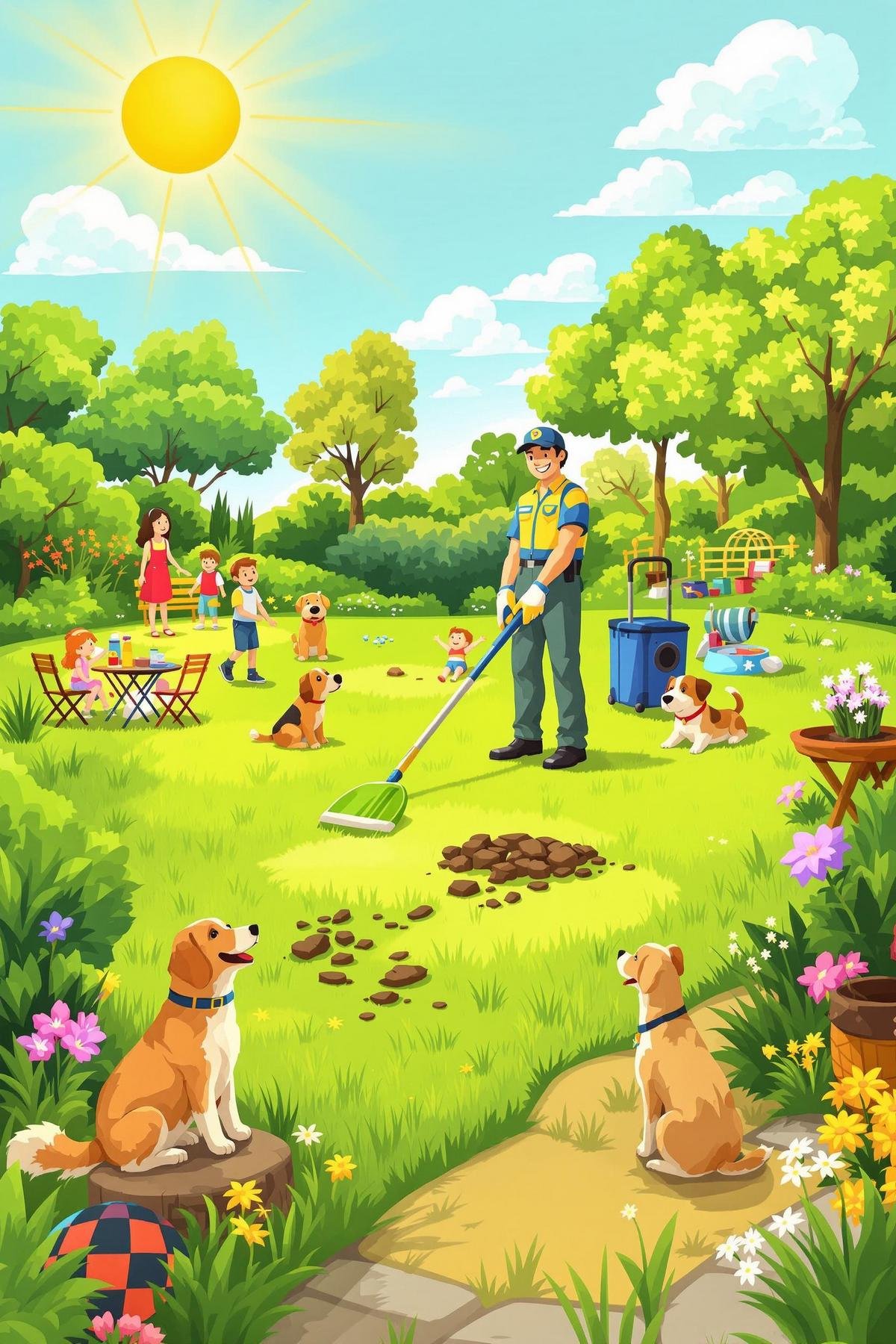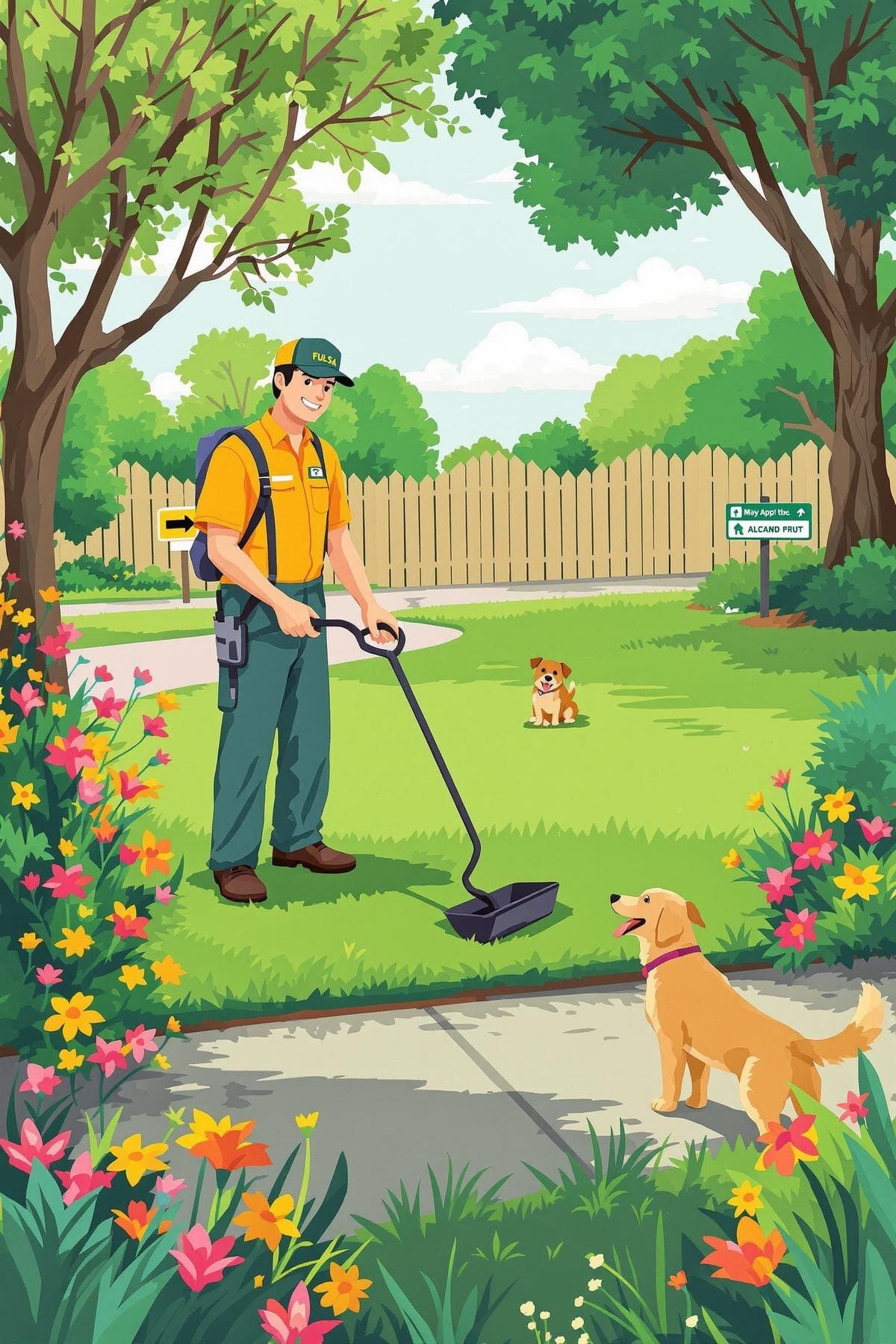
Estimated reading time: 8 minutes
Key Takeaways
- Dog waste in Tulsa yards poses significant health risks to families, especially children.
- Dog poop can harbor parasites, bacteria, and viruses harmful to humans and pets.
- Unattended dog waste negatively impacts the environment, including soil and water contamination.
- Dog feces can cause lawn disease and attract pests like ticks and fleas.
- Proper dog waste management is essential for protecting your family and the environment.
Table of contents
As Tulsa’s dog-loving community continues to grow, so does the concern over a less pleasant aspect of pet ownership: dog waste in our yards. With an estimated population of over 400,000 people and a considerable number of dog owners, the issue of unattended dog poop has become a pressing matter for public health and environmental well-being in our city.
Many Tulsa residents are increasingly worried about the impacts of dog waste left in yards, and for good reason. The consequences extend far beyond mere inconvenience, posing serious threats to our families’ health and the local ecosystem. Let’s delve into why proper management of dog waste is crucial for maintaining a safe and clean Tulsa.
Understanding the Health Risks
The dangers of dog poop for kids in Tulsa cannot be overstated. Children, who often play outdoors and are more likely to come into contact with contaminated soil or grass, face a higher risk of exposure to harmful pathogens lurking in dog waste.
Dog poop parasite risks in Tulsa are a significant concern. Dog feces can harbor a variety of parasites, including:
- Roundworms
- Hookworms
- Tapeworms
These parasites can infect humans, leading to a range of symptoms from abdominal pain and diarrhea to more severe cases of organ damage. Alarmingly, the Centers for Disease Control and Prevention (CDC) reports that 14% of Americans have been infected with roundworms at some point in their lives.
Bacteria from dog poop in Tulsa soil pose another serious health threat. Dog waste often contains harmful bacteria such as:
- E. coli
- Salmonella
- Campylobacter
These bacteria can cause gastrointestinal illnesses, with young children being particularly vulnerable due to their developing immune systems. The risk is heightened when children play in yards or parks where dog waste has not been properly removed.
Viruses present in dog feces add another layer of concern. Some viruses, like parvovirus, can be highly contagious and potentially fatal to other dogs, creating a cycle of health risks within the pet population.
While specific statistics for Tulsa are not readily available, it’s reasonable to assume that the prevalence of these health risks is similar to national averages. This underscores the importance of addressing the issue of dog waste in our community.
For more information, visit this resource.
Environmental Impact of Dog Waste
The Tulsa dog poop environmental impact extends far beyond our backyards. When left unattended, dog waste can have severe consequences for our local ecosystem:
Water Contamination
Rain and irrigation can wash dog feces into storm drains, eventually contaminating local water sources. This leads to increased levels of harmful bacteria and parasites in streams, lakes, and rivers, posing risks to both human health and aquatic life.
Soil Contamination
Bacteria from dog poop can persist in soil for extended periods, potentially affecting plant growth and soil quality. Studies have shown that dog feces can introduce harmful pathogens like E. coli and Salmonella into the soil, creating long-lasting environmental hazards.
Learn how to address this by reading this guide.
Nutrient Pollution
Dog waste contains high levels of nitrogen and phosphorus. When these nutrients enter water bodies, they can contribute to excessive algae growth, known as algal blooms. These blooms decrease oxygen levels in water, harming aquatic life and disrupting local ecosystems.
Impact on Local Wildlife
The presence of dog feces in natural areas can alter the behavior and health of local wildlife, potentially disrupting ecosystems. This impact, while less visible, can have far-reaching consequences for Tulsa’s biodiversity.
By understanding these environmental impacts, we can better appreciate the importance of proper dog waste management in preserving Tulsa’s natural beauty and ecological balance.
For practical tips, visit this resource.
Risks of Lawn Disease
Is dog poop bad for Tulsa lawns? The answer is a resounding yes. Dog waste can significantly contribute to lawn diseases, affecting both the aesthetic appeal and health of our yards.
High Nitrogen Content
Dog feces have high nitrogen levels, which can “burn” grass, leading to brown spots and bare patches. This can quickly turn a lush, green lawn into an unsightly patchwork of dead and dying grass.
Bacteria and Parasites Affecting Grass
The bacteria and parasites present in dog waste create an unhealthy environment for grass growth. These pathogens can infiltrate the soil, impacting not just the surface of your lawn but its overall health from the roots up.
Signs of lawn disease exacerbated by dog poop include:
- Discolored patches of grass
- Thinning or dying grass
- Unusual growth patterns
- Presence of fungi or mold
To prevent lawn disease from dog poop in Tulsa, regular removal of dog waste is crucial. Read more about this in this article. Prompt cleanup can prevent the spread of pathogens and reduce the risk of lawn diseases, maintaining the health and appearance of your yard.
For additional information, visit this resource.
Pest Control Concerns
The tick and flea risks from dog poop in Tulsa present yet another layer of concern for homeowners and pet owners alike. Dog waste left in yards can attract these pests, creating a breeding ground for potential infestations.
Attraction of Pests
Dog feces can attract ticks and fleas, which thrive in warm, moist environments. These pests can quickly multiply, turning your yard into a hotspot for infestation.
Health Risks of Ticks
Ticks are known carriers of diseases like Lyme disease and Rocky Mountain spotted fever. These diseases can affect both humans and pets, posing serious health risks. The presence of dog waste in yards increases the likelihood of tick populations, thereby elevating the risk of tick-borne illnesses.
Health Risks of Fleas
Fleas can cause skin irritation and allergic reactions in pets and humans. In severe cases, fleas can transmit tapeworms or cause anemia in pets. The itching and discomfort caused by flea bites can significantly impact the quality of life for both pets and their owners.
Impact on Families
The presence of these pests increases the likelihood of infestation in homes, creating further health concerns. Once fleas or ticks enter your home, they can be challenging and costly to eradicate, leading to ongoing health risks for your family and pets.
By maintaining a clean yard free of dog waste, you can significantly reduce the attraction of these harmful pests, protecting both your outdoor and indoor environments. Learn more at this link.
For more on tick prevention, visit the CDC website.
Importance of Cleaning Up Dog Waste
Understanding why we should remove dog poop from Tulsa yards is crucial for maintaining a healthy community. Here are the key reasons:
Health Protection
Regular cleanup reduces the risk of disease transmission to humans and other animals. By promptly removing dog waste, we can minimize the spread of parasites, bacteria, and viruses that pose health risks to our families and pets. Read more at this article.
Environmental Preservation
Proper disposal prevents contamination of soil and water sources. This helps maintain the ecological balance of our local environment and protects our water resources from pollution.
Lawn Maintenance
Prompt removal helps maintain a healthy and attractive lawn. By preventing the “burn” effect of dog waste on grass and reducing the spread of pathogens in the soil, we can keep our yards lush and vibrant.
Pest Control
Reducing waste in yards decreases the presence of harmful pests like ticks and fleas. This not only protects our pets but also reduces the risk of these pests invading our homes.
Practical Tips on Managing Dog Waste
- Use biodegradable bags to collect waste. This ensures that the bags themselves don’t become an environmental problem.
- Dispose of waste in designated trash bins. Never put dog waste in recycling or compost bins.
- Consider installing a pet waste station in your yard. This can make regular cleanup more convenient and encourage consistent habits.
- Clean up waste promptly, ideally within 24 hours. The longer waste sits, the greater the risk of contamination and spread of pathogens.
- Wash hands thoroughly after handling pet waste to prevent the spread of bacteria and parasites.
By following these practices, we can significantly reduce the health risks of dog poop in Tulsa yards and contribute to a cleaner, safer environment for everyone.
For more tips, visit this resource.
Frequently Asked Questions
What diseases can humans get from dog poop?
Humans can contract various diseases from dog poop, including bacterial infections like Salmonella and E. coli, as well as parasitic infections from roundworms and hookworms.
How does dog waste affect the environment?
Dog waste contributes to water and soil contamination, nutrient pollution, and can harm local wildlife by introducing harmful pathogens into the ecosystem.
What is the best way to dispose of dog waste?
The best way is to use biodegradable bags and dispose of the waste in designated trash bins. Avoid leaving pet waste on the ground or disposing of it in compost bins.
Can dog poop kill grass in my yard?
Yes, the high nitrogen content in dog poop can burn grass, leading to brown spots and dead patches in your lawn.
How often should I clean up dog waste from my yard?
It’s recommended to clean up dog waste promptly, ideally within 24 hours, to reduce health risks and prevent environmental contamination.
Conclusion
The health and environmental risks associated with dog poop in Tulsa yards are significant and should not be overlooked. From the dangers of dog poop for kids in Tulsa to the broader environmental impacts, the consequences of neglecting pet waste management are far-reaching.
We’ve explored how dog waste can harbor parasites, bacteria, and more, highlighting the critical need for effective waste management strategies to protect both public health and the environment.
Latest Posts

How Much Does Pooper Scooper Service Cost in Tulsa? A Comprehensive Breakdown

Health Risks of Dog Poop in Tulsa Yards: Protecting Your Family and Environment

Benefits of Pooper Scooper Service Tulsa: How It Can Save Time, Improve Yard Cleanliness, and Enhance Your Lifestyle

Pooper Scooper Service Tulsa: Everything Pet Owners Need to Know


